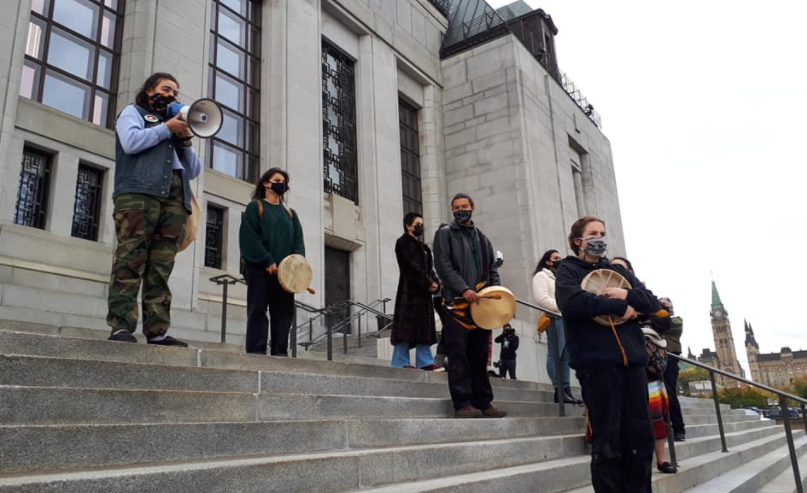1492 Land Back Lane highlights need to address land theft instead of criminalizing land defenders
Written by: Brent Patterson
Indigenous land defenders and allies gathered on the steps of the Supreme Court of Canada on October 9 in solidarity with 1492 Land Back Lane and other Indigenous land defence struggles for sovereignty and justice.
Six Nations land defenders began an occupation on July 19 of the construction site of a housing development near the city of Caledonia, Ontario.
On October 9, CBC reported: “An Ontario Superior Court judge has given the 1492 Land Back Lane camp until Oct. 22 to vacate land slated to become a subdivision in Caledonia, Ont., before he rules on making an injunction against their presence permanent.”
That article adds: “Justice R.J. Harper said if the camp occupiers vacated he would hear constitutional arguments presented by [Six Nations land defender] Skyler Williams… Harper said if they remain on the site, he would exclude Williams from the scheduled hearing and hear arguments only from [the parties] seeking the permanent injunction.”
Williams comments: “Ideally, courts would recognize the long history of injustices that have been committed against the Haudenosaunee, but once again we face an ultimatum that leaves us with hard choices: enter into a colonial process and watch as our lands get developed or stay on our territory and face police violence.”
Gladue Principles
Williams adds: “Our legal argument highlights one key issue of injunctions: that because injunctions result in criminal charges, Gladue Principles have to be considered when Indigenous land rights are at stake.”
Gladue refers to a Supreme Court of Canada ruling in April 1999 that acknowledges systemic racism against Indigenous people in Canada and in the justice system and refers to the special consideration that judges must give an Indigenous person when setting bail or during sentencing.
The Supreme Court reaffirmed in March 2012 the importance of Gladue and noted that courts have displayed “an inadequate understanding of the devastating intergenerational effects of the collective experiences of Aboriginal peoples.”
The trouble with court injunctions
Kate Gunn, a Vancouver-based lawyer with First Peoples Law, has also pointed out that an injunction is not a determination of which party is right, rather it seeks, in principle, to preserve the status quo until the underlying dispute is resolved.
That means, for instance, that a land developer can more easily persuade the court that the economic harm is greater to them than communities seeking to protect their culture and traditions from centuries of land dispossession.
Williams has stated: “This development must be seen as being yet another instance in an ongoing history of colonial land theft and genocide, that it is people from Six Nations who are facing the greater harm if this matter is decided against their interests.”
The right to free, prior and informed consent
The Haudenosaunee Confederacy Chiefs Council has also not granted its free, prior and informed consent (FPIC) for the development. FPIC is a key principle in the United Nations Declaration on the Rights of Indigenous Peoples, an instrument that represents, in the words of the UN, “the dynamic development of international legal norms.”
Notably, the land being occupied is part of the Haldimand Tract that was granted in 1784 to the Six Nations of the Grand River. Six Nations launched a challenge in the Ontario Superior Court of Justice in 1995 for the unlawful dispossession of this land from them, but it is not scheduled to be heard until October 2022.
Similarly, Supreme Court of Canada recognition of Tsilhqot’in title over their traditional territory in British Columbia took more than two decades to win and illustrates the barriers faced implicitly and explicitly with the doctrine of discovery.
People will be watching to see what happens in court on October 22 in relation to this current land occupation. Some of the land defenders arrested in this struggle are also scheduled to appear in court on October 20.
1492 Land Back Lane has set up this Legal Fund to assist with their legal costs. For the latest updates, see #1492LandBackLane on Twitter.
More Articles






